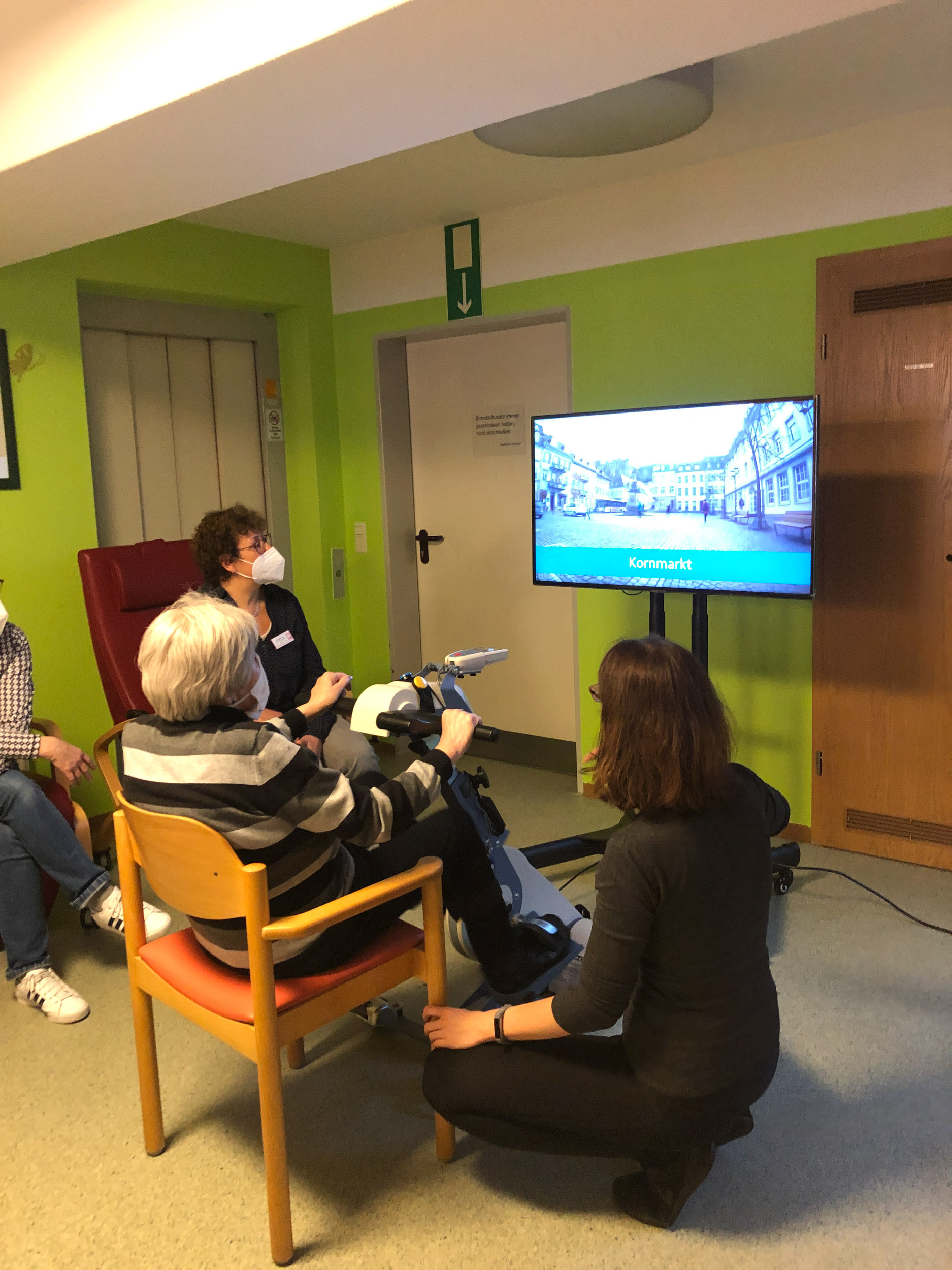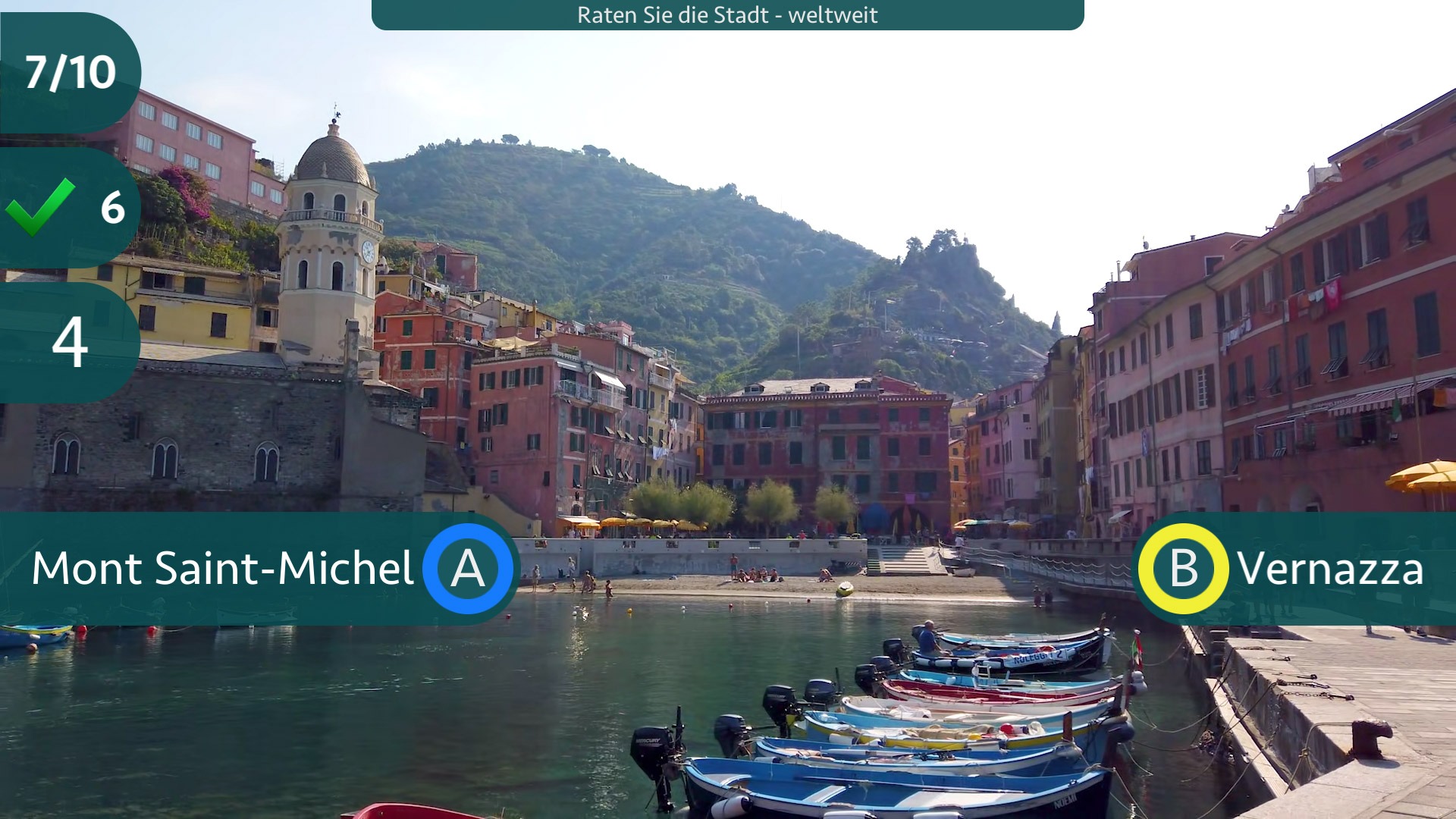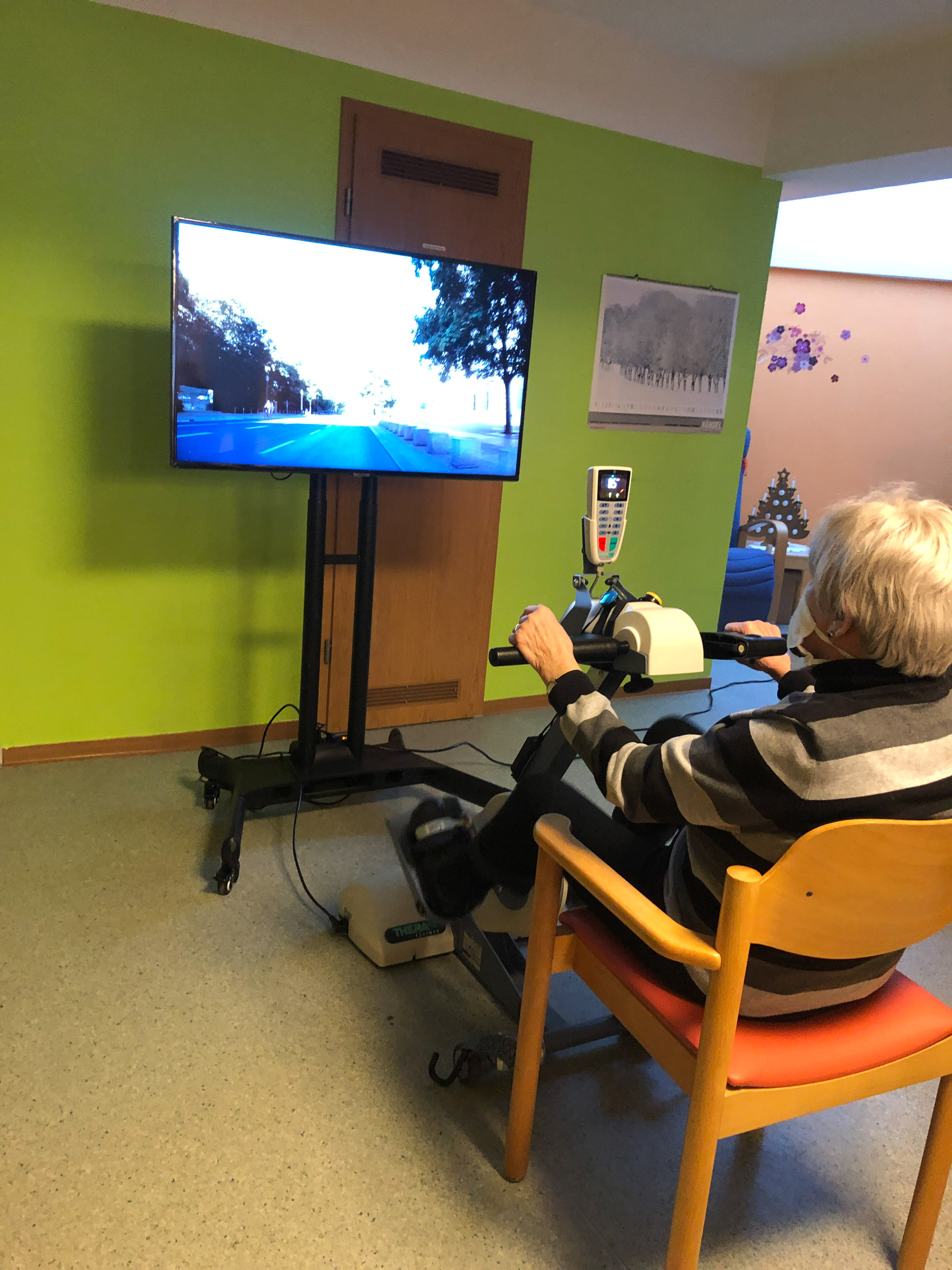
Discover how virtual bike tours with Bike Labyrinth support seniors at Caritas TagesOase Bruchsal in staying active and reviving memories. Facility Manager Daniela Benz shares insights on motivation, mental stimulation, and quality of life.

My name is Daniela Benz. I’ve been working at the Caritas TagesOase (CTO) Bruchsal as a Facility Manager for nine years.
We hardly use digital durable medical equipment at all here in the CTO at the moment. The Bike Labyrinth was the first digital medium we ever tried here. Of course, we have a radio and music on CD, but we don’t do anything with computers for seniors at the moment. When our CTO was closed in spring 2020 due to the pandemic, the staff were deployed in the Caritas homes. In Oberhausen, I helped the seniors to use Skype so that they could see their relatives on a tablet. This was very touching for me because I’m used to it from the CTO that the visitors go home again and then don’t get to see their loved ones for weeks like in the home.
Most of the guests have a walking disability. A lot of them use a rollator or a walking aid. They are physically encouraged by daily seated gymnastics and a walk through the city, as we are fortunately centrally located near the Bruchsal weekly market. This walk is between 30 to 45 minutes daily with rollators, wheelchairs and walkers. We also enjoy taking part in events organised by the city of Bruchsal. It’s not digital, but it is fun! For example, in October 2020 there was the Bruchsal Hope Run, where our day guests marched 80.7 km.
Dr Schoch is our gerontologist from the Caritas Association. She does a lot of training and actively looks for projects and durable medical equipment that might be of interest to us. Since I’m a very open-minded person and like to try out a lot of things, she asked me if I would like to try out a trim bike with our guests, where they can cycle and see where they’re going on a monitor. I couldn’t really imagine it myself to be honest. Nevertheless, I immediately agreed, as we’re not allowed to do much at the moment because of Covid. We usually had musicians come visit us: dancing and swaying three times a week. And all that has now fallen through because of the pandemic. Now it’s a matter of keeping a metre and a half distance from each other and no hugging. And the Bike Labyrinth was just a nice change from all that.
The incentive was actually the TV with the lifelike images. Our guests were able to cycle in a city they had been to before. It wasn’t so much about the mountains or the snowy landscapes, but really about the cities that our guests know. They were totally into it, because they cycled through streets they could recognise.
But they were also excited about seeing places they would like to visit. One of our guests, who has apoplexy, really wanted to go to the Copacabana, to see the young girls in bikinis. That was funny for all of us.
Dr Schoch is our gerontologist from the Caritas Association. She does a lot of training and actively looks for projects and durable medical equipment that might be of interest to us. Since I’m a very open-minded person and like to try out a lot of things, she asked me if I would like to try out a trim bike with our guests, where they can cycle and see where they’re going on a monitor. I couldn’t really imagine it myself to be honest. Nevertheless, I immediately agreed, as we’re not allowed to do much at the moment because of Covid. We usually had musicians come visit us: dancing and swaying three times a week. And all that has now fallen through because of the pandemic. Now it’s a matter of keeping a metre and a half distance from each other and no hugging. And the Bike Labyrinth was just a nice change from all that.
The incentive was actually the TV with the lifelike images. Our guests were able to cycle in a city they had been to before. It wasn’t so much about the mountains or the snowy landscapes, but really about the cities that our guests know. They were totally into it, because they cycled through streets they could recognise.
But they were also excited about seeing places they would like to visit. One of our guests, who has apoplexy, really wanted to go to the Copacabana, to see the young girls in bikinis. That was funny for all of us.
They’re memories from the past. People with dementia in particular still remember everything that happened in the past. For example, one guest was born in Heidelberg. He lived there, worked there and of course he knew every alley and the castle! He had such fun riding his bike through Heidelberg. He told us during the bike tour through Heidelberg where he did his training. He has dementia, so it’s insanely nice to see that everything from the past is still in there and resurfaces when you give a little nudge. Knowledge comes out of nowhere from one minute to the next.

The Bike Labyrinth is a trim bike connected to a large monitor. Our guests can select which city or country they would like to cycle to with two buttons. The (rolling) chair on which you sit is secured beforehand with an anti-tilt device. Because the guests sometimes push off so hard or step in so firmly that they tip over backwards. This anti-tip device is actually very important for us. The pedals with foot and leg supports are also useful for guests to set up their legs properly, especially for the hemiplegic users who have no feeling in their legs.
1. Something new to do and a change from everyday life
The advantages are quite clear. For example, not all day visitors can take part in our city walks. These guests, who stay in the CTO, have a lot of fun using the Bike Labyrinth. That went down very well. Some guests even insist on walking AND cycling. We put some time aside for this again at lunchtime. There was a lot of interest because everyone raved about it. From the bike routes, to the guessing games and the sound of a bike bell at the beginning of each route.
Everyone sat together and enjoyed the beautiful landscapes. For example, we were in Austria in the snow – because unfortunately there’s none here in Bruchsal. Of course, the cities also were a big hit, especially if the guests knew them. Our puzzle fans liked the guessing games.
The whole group sat in on the quiz! With us, there’s no shame in not being able to say something. There was a lot of discussion and the person who was at the wheel then decided for the group.
It was really nice to see how a guest who had already had a stroke and could no longer walk could decide for himself where to go. Precisely because this isn’t an option for him in normal life.
To become physically fitter, the guests would have to ride more. Many only cycle for 15 minutes once or twice a week, which is not enough. But it definitely gives our guests a mental boost. Deciding and remembering are important: being able to choose for themselves which city they want to go to and then also remembering that they have already been there. It’s just a pity that Bruchsal or Calw, for example, were not yet on the system. Cities where people come from or live. That would be best for the memory work. People then know exactly where they have been shopping or in which street their aunt or cousin lives.
When our guests and the residents of the homes feel comfortable with Bike Labyrinth and there is so much joy every day, then the purchase of Bike Labyrinth pays off. As management, we see whether a product is well received by our seniors. And if we endorse Bike Labyrinth, then buying it already makes a lot of sense. We plan to purchase at least one system after the trial orders and have it rotate between the homes and the Day Oases on a quarterly basis.



Related contents
Find related exciting contents in our media library.
Meet our specialists.
Are you interested in our solutions? Schedule a meeting with a Consultant to talk through your strategy and understand how TEHRA-Trainer can help you to advance rehabilitation.
You need to load content from reCAPTCHA to submit the form. Please note that doing so will share data with third-party providers.
More InformationYou are currently viewing a placeholder content from Turnstile. To access the actual content, click the button below. Please note that doing so will share data with third-party providers.
More Information